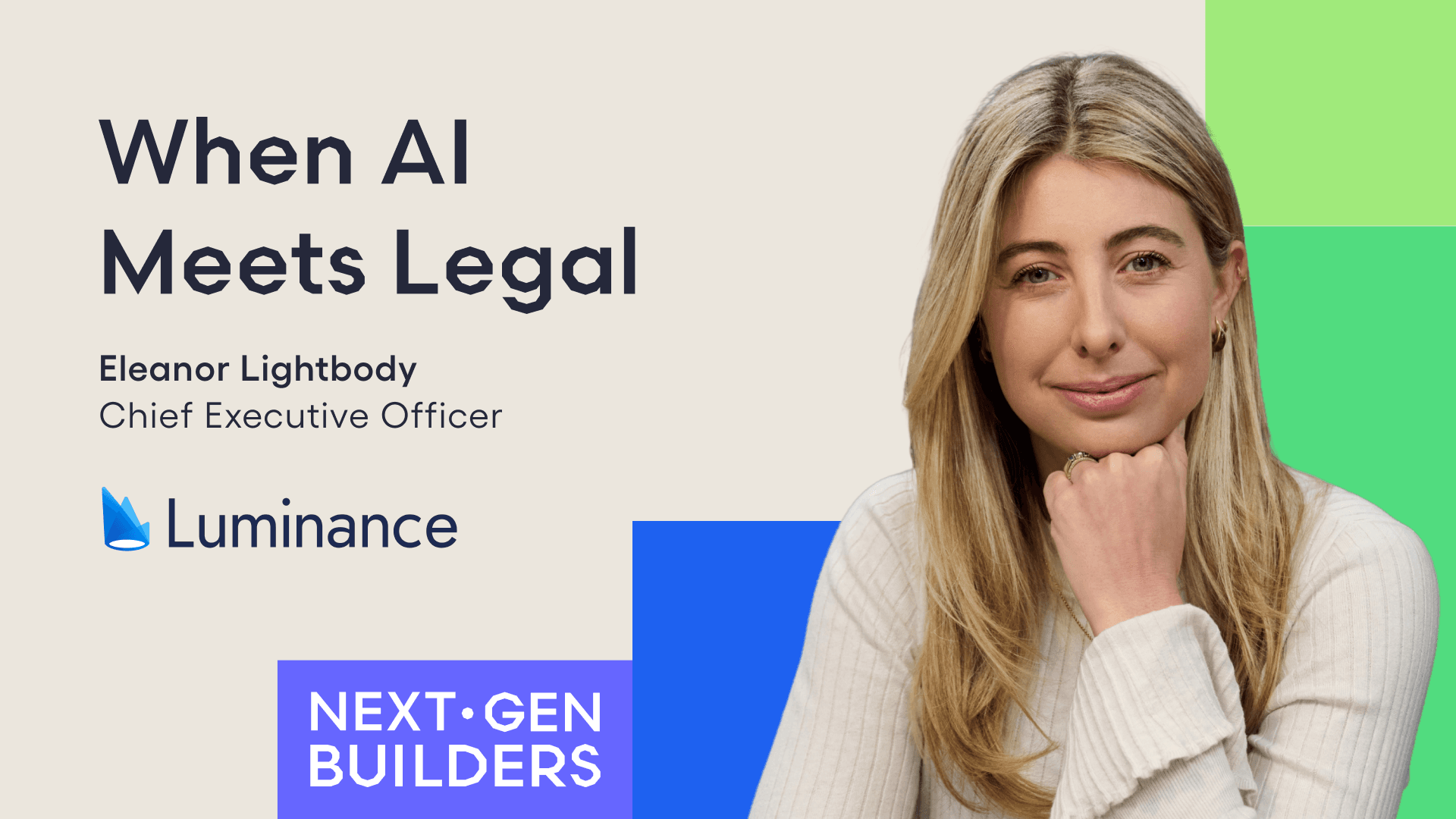Meet the Next Gen Builder: Eleanor Lightbody, CEO at Luminance
How Luminance builds trustworthy AI for one of the world’s most risk-averse industries
Everybody’s chasing AI, but only a few can make it truly trustworthy.
At Luminance, the pioneer in Legal-Grade™ AI for enterprise, CEO Eleanor Lightbody is achieving just that. In this episode of the Next Gen Builders podcast, Eleanor sits down with host Francois Ajenstat to reveal how her team builds AI that can’t afford to be wrong.
Read on as we unpack how Luminance is bringing specialized, agentic AI to the legal industry; why explicit uncertainty is better than confident nonsense; and how “blue-sky” thinking can help you move faster as the ground keeps shifting.
Listen to the full episode on Apple Podcasts, Spotify, or YouTube.
What Luminance does
Luminance’s Legal-Grade AI™ helps legal teams automate contract reviews, identify risks, and streamline workflows. Put another way, it learns how each user and organization works and then augments how contracts are created, negotiated, and analyzed.
Why specialized AI is primed for legal
The legal field isn’t necessarily what people think of as “tech-forward.” But Eleanor thinks of her industry in a different light. Like so many industries, legal is made of people and processes. And AI, which is inherently industry agnostic, can and should play a role.
Legal work is text-heavy, repetitive, and high-stakes. It’s also still largely manual. That makes it a perfect candidate for domain-specific AI—so long as the system doesn’t hallucinate answers.
“You need to have specialized AI that really understands legal contracts and what’s in them and doesn’t make up answers. That’s how you help accelerate and drive efficiencies within the work.”
—Eleanor Lightbody, CEO, Luminance
From pre-AI ML to multi-model orchestration
Luminance started as a machine-learning company and evolved into a multi-model, agentic stack. Different models handle different tasks, outcomes are checked for probabilistic consensus, and when AI isn’t confident in the output, the system automatically flags it to a human.
Eleanor cannot state this emphatically enough. Lawyers, she says, would rather get an “I don’t know” from the AI than four different and conflicting answers.
AI transparency is crucial in the legal field. Eleanor says that lawyers begin to trust AI when they know uncertain outputs will be escalated to a human, who can then take on those tasks. Of course, legal work is extremely high-stakes. But the human relationship with AI is similar to any other field.
“If the model output says, ‘I don’t know the answer here,’ it actually allows the human to feel empowered to use it, rather than feel hesitant about the change.”
—Eleanor Lightbody, CEO, Luminance
Be AI-native, not AI-adjacent
Eleanor’s operating question for every function, from engineering to sales, is simple: “Why can’t AI do this first?” This mindset pushes teams to look for automation before defaulting to manual work.
The outcome is an organization that treats AI as the default setting. That shift creates:
- Speed that compresses feedback loops from weeks into minutes
- Consistency that ensures decisions and workflows follow a repeatable logic
- Scalability that lets teams focus on higher-value judgment calls rather than repetitive busywork
“The question I always ask is, ‘Why can’t AI do this first?’ Then we figure out what the human should do. The speed advantage is massive”
—Eleanor Lightbody, CEO, Luminance
Luminance’s blue-sky team
To make sure it doesn’t just optimize for today, Luminance runs a “blue-sky” thinking team: a small group prototyping AI’s “weird and wonderful” futures. When an idea or new model works, it’s added to the main product.
This structure balances innovation with execution:
- Exploration without distraction: Long-horizon bets aren’t slowed down by day-to-day delivery.
- Progressive integration: Only ideas that prove out get folded into core teams.
- Cultural permission: Everyone knows exploration is valued.
Eleanor’s path to CEO
Eleanor Lightbody didn’t enter legal through law but through AI and sales. From scaling Darktrace across Africa and the Middle East to now leading Luminance, her journey’s throughline has been distribution, customer focus, and data-driven decision making.
Her philosophy when stepping in as a leader is not to change everything or nothing, but to change the things the data proves will move the needle.
Eleanor’s advice for aspiring CEOs, especially women in tech, is simple: Just start. Learn by doing, move up from wherever you land, and seek mentors for specific problems, not just general guidance.
For aspiring leaders, she frames it as three steps:
- Get in the door. Start anywhere, but start.
- Learn on the job. The best MBA is lived experience.
- Use mentorship wisely. Come with concrete problems, not vague asks.
“If you’re interested in something, just go. And you’ll be surprised at what opportunities come thereafter.”
—Eleanor Lightbody, CEO, Luminance
Tune into Eleanor’s story
These highlights are just a piece of Eleanor’s insights on building trustworthy AI in high-stakes domains while operating at speed. Dive into the full conversation on your favorite podcast platform.
Want to make sure you don’t miss an episode of Next Gen Builders? Subscribe today.

Brynn Haynam
Sr. Director, Brand Marketing, Amplitude
Brynn Haynam is a brand builder who's always had a passion for the intersection of art and data, and for building world-class creative teams. Before Amplitude, Brynn built and led a brand team at Medallia and helped grow the business from startup to a publicly traded company.
More from BrynnRecommended Reading

Amplitude’s All-Star Weekend with the NBA Foundation: A Recap
Feb 26, 2026
5 min read

Amplitude Pathfinder: How Zach Phillips went from “IT Guy” to Analytics Leader
Feb 25, 2026
12 min read

Amplitude + Lovable: Launch, Learn, Repeat
Feb 23, 2026
3 min read

Amplitude + Figma: Make What Matters
Feb 20, 2026
4 min read

